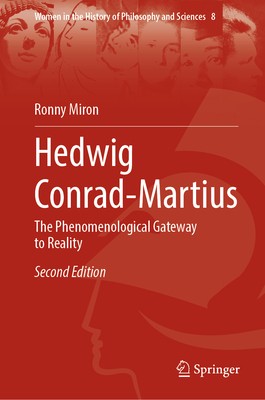
- We will send in 10–14 business days.
- Author: Ronny Miron
- Publisher: Springer
- ISBN-10: 3031254155
- ISBN-13: 9783031254154
- Format: 15.6 x 23.4 x 2.7 cm, kieti viršeliai
- Language: English
- SAVE -10% with code: EXTRA
Reviews
Description
This volume, the first of its kind written in English, interprets the realistic-phenomenological philosophy of Hedwig Conrad-Martius (1888-1966). She was a prominent figure in the Munich-Göttingen Circle, the first generation of phenomenology after Edmund Husserl (1859-1938), and was known as the "first lady of German philosophy".The articles included in this collection deal with the two main themes constituting her realistic-metaphysical phenomenology: Being and the I. The new edition includes an additional chapter opening a new path into the study of Conrad-Martius with Heidegger. In addition, the collection includes a comprehensive Introduction that describes the personal background and the social and philosophical contexts behind Conrad-Martius's thought, with an emphasis on the mutual influence and fertilization of the group of early phenomenologists in the Munich-Göttingen Circle. The book is aimed at scholars of philosophy and educated readers.
EXTRA 10 % discount with code: EXTRA
The promotion ends in 21d.13:13:20
The discount code is valid when purchasing from 10 €. Discounts do not stack.
- Author: Ronny Miron
- Publisher: Springer
- ISBN-10: 3031254155
- ISBN-13: 9783031254154
- Format: 15.6 x 23.4 x 2.7 cm, kieti viršeliai
- Language: English English
This volume, the first of its kind written in English, interprets the realistic-phenomenological philosophy of Hedwig Conrad-Martius (1888-1966). She was a prominent figure in the Munich-Göttingen Circle, the first generation of phenomenology after Edmund Husserl (1859-1938), and was known as the "first lady of German philosophy".The articles included in this collection deal with the two main themes constituting her realistic-metaphysical phenomenology: Being and the I. The new edition includes an additional chapter opening a new path into the study of Conrad-Martius with Heidegger. In addition, the collection includes a comprehensive Introduction that describes the personal background and the social and philosophical contexts behind Conrad-Martius's thought, with an emphasis on the mutual influence and fertilization of the group of early phenomenologists in the Munich-Göttingen Circle. The book is aimed at scholars of philosophy and educated readers.


Reviews